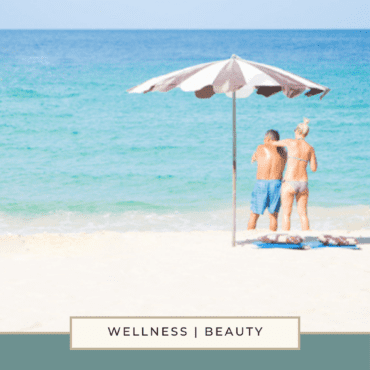While I can easily go without makeup for months, safer sunscreen is something I use daily.
Safer Sunscreen
Sunscreen is a personal care product on my “must have” list! Because some sunscreens contain toxic ingredients and have been recalled, this product category is something I’ve researched extensively.
Researching Clean Living
I’ve been in the health industry since the early 1990s, and during the last 30+ years, I’ve made it my mission to create the healthiest diet and overall lifestyle that I can.
Part of that is understanding that what we put on our bodies is as important as what we put in them –for me, clean living doesn’t stop with diet or the foods we eat.
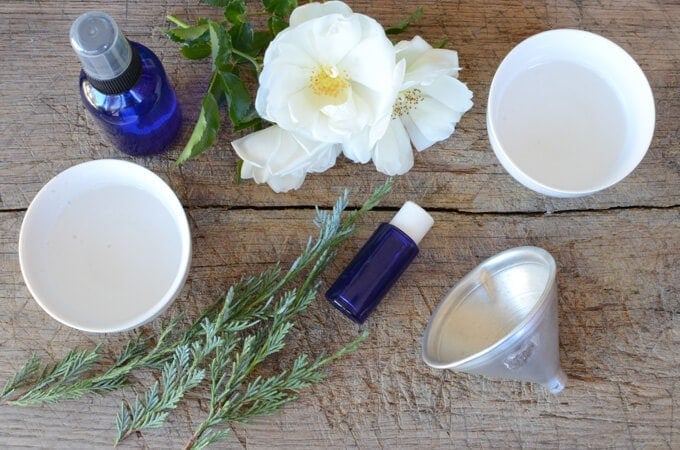

Personal Care Products for Clean Living
I believe the substances we introduce to our living space are just as impactful to our health, so I’ve created my own non-toxic household cleaning products and personal care products.
As you can see, the intersection of health with holistic living is about so much more than what goes in your mouth.


Get My Keto Recipes eBook
Free exclusive eBook, plus recipes and health tips, delivered to your inbox.
Clean Living and the MTHFR Gene
Many of us become so focused on diet that we forget about what we put on our skin. That’s a mistake because our skin is our largest organ of absorption, and what we apply to it is critical.
The skin not only absorbs products but eliminates waste. Because of this, it’s often called the “third kidney,” which is another reason I treat mine with care.
Because I have the MTHFR genetic mutation, this is even more crucial for me. People with the MTHFR gene have impaired detoxification, so avoiding products with toxic ingredients is of importance.
Safer Sunscreen
Growing up in California, my friends and I baked in the sun. By the time I was in my 20s I wasn’t outside much, I spent my time indoors building my first company.
Once I reached my 30s, I started thinking about aging. My top beauty secrets? Sleep, diet, and moderate exercise.


Safe to Use Sunscreen
I also realized that applying good sunscreen to my face might help prevent wrinkles. Since then I’ve used sunscreen on my face religiously. When I go out for a walk I also wear a baseball hat and sunglasses.
It’s great to use these items to protect the delicate skin on your face. It’s also important to find a fantastic sunscreen that does not contain harmful endocrine disrupting chemicals and other toxins.
Safe Sunscreen When Pregnant
When we were starting our family I realized that safe sunscreen when pregnant was critical, as the tiny developing embryo is more vulnerable to harmful substances than children and adults.
Sunscreen Recall 2021
Fast forward to 2021, when a number of sunscreen products were recalled due to harmful toxicity levels.
I was relieved that I had done so much research into personal care products from head to toe, including sunscreen.
Is Benzene Harmful?
Frighteningly, Sunscreen Recall 2021 involved benzene, a very toxic, carcinogenic chemical that causes multiple health issues in adults and children alike.
Why is benzene so harmful? This chemical compound can be lethal because it causes the cells in the body to work incorrectly.
Benzene Toxicity
Benzene exposure can cause bone marrow cells to lower red blood cell production, and it can cause white blood cells in the immune system to fail.1
Some industries use benzene to make the chemicals used in plastic products and more. Benzene is also used in lubricants and detergents, as well as pesticides.2
Sunscreen Recall Brands
Sadly, mainstream sunscreen brands contaminated with benzene in Sunscreen Recall 2021 included:
- Coppertone
- Neutrogena
- Aveeno
I was troubled by these findings, given that a number of household name brands were included.
What are Safe Sunscreen Ingredients?
Below, you will find what’s not in my sunscreen because the following items are not always considered safe. Buyer beware, read sunscreen ingredients labels carefully!
Read Sunscreen Labels
This list includes endocrine disruptors such as parabens, oxybenzone, and a number of other unhealthy ingredients that may be hiding in your sunscreen.
- Aerosol Spray -application method that can expose lungs to hazardous chemicals
- Aluminum -coloring agent and neurotoxin that affects diverse metabolic reactions
- Oxybenzone -photostabilizer and endocrine disrupting chemical that can lead to adverse cellular change
- Parabens -preservative and endocrine disrupting chemical that may lead to hormonal imbalance
- Propylene Glycol -skin conditioning agent that can lead to eye, skin, and lung irritation as well as organ system toxicity
Sunscreen Causes Cancer?
Finding benzene and endocrine disrupting chemicals in products can lead to concerns that sunscreen causes cancer.
Given these types of incidents, I find researching healthy living more important than ever.
How to Choose a Safe Sunscreen
Wondering how to choose a safe sunscreen? First, read labels to make sure the ingredients above (and others) are not in the product.
Second, there are findings that mineral-based sunscreens like zinc oxide products may be safer than chemical sunscreens.
EWG Safe Sunscreen Ratings
In addition to reading labels, you’ll want to go to the Environmental Working Group website for guidance.
EWG Ratings
I trust the EWG ratings and use them myself to verify that the products I use do not contain the toxic ingredients above.
Safe Sunscreen Zinc Oxide
Although many people prefer them because they rub into the skin more easily, I don’t use chemical-based sunscreens
I prefer alternatives with zinc oxide, the main active ingredient in the sunscreens I I use to block out the sun.
Is Zinc Oxide Sunscreen Full Spectrum?
Zinc oxide is unique because it is a truly broad spectrum blocker that protects from UVA and UVB.
Zinc oxide scores well with the Environmental Working Group because it provides “strong sun protection with few health concerns.” EWG also rates it highly because it doesn’t break down in the sun.
Which Sunblock is Best
Finding the right sunscreen isn’t as easy as you’d think.
I went through product after product for several years until I landed on my non-toxic sunscreen favorites, and I work to update the list each summer since manufacturers’ ingredients can change over time.
What is Safe Sunscreen?
By now, you have a pretty good picture of what makes a sunscreen safe.
Along those lines, below are sunscreens full of safe ingredients that work well for me when it comes to blocking out the sun.
Here, I list them in order of favorites, top to bottom!
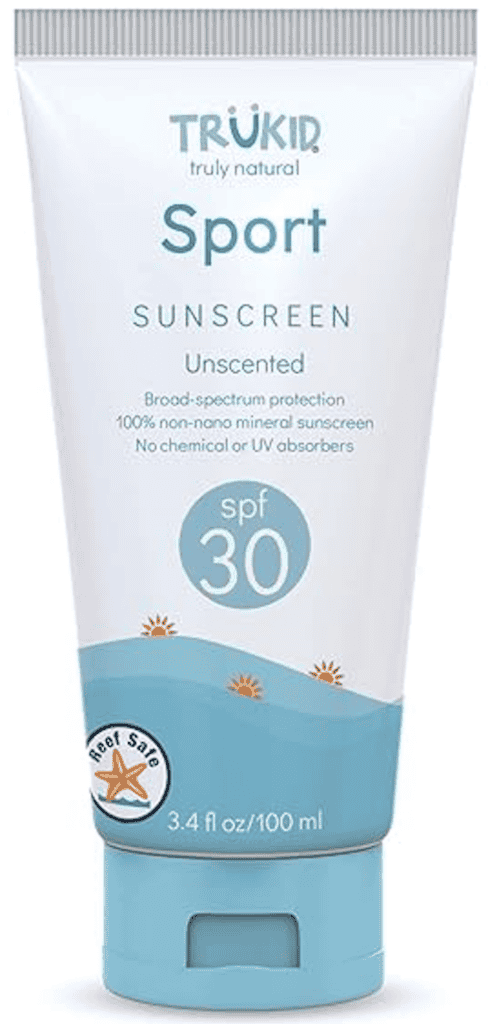

TruKid Sunny Days Sport Sunscreen
TruKid Sunny Days Sport Sunscreen has a long name but a short ingredient list. I love that. This is one of the cleaner sunscreen products I’ve tried and recommended.
Can I tell you a secret? Because my skin is so sensitive, I like to use personal care products that are gentle enough for an infant.
Beware though, not everything that’s labeled “baby safe” actually is, so you’ll still need to check ingredients when using baby products.
TruKid has fantastic ingredients, which include aloe vera juice, pine resin, coconut, castor oil, magnesium (from Epsom salt), jojoba and green tea oils, and pomegranate juice –what more could a mom ask for?!
- 20% Non-Nano Zinc Oxide
- SPF 30
- Non-Toxic Ingredients
- Fragrance-Free
- EWG Rating = 1
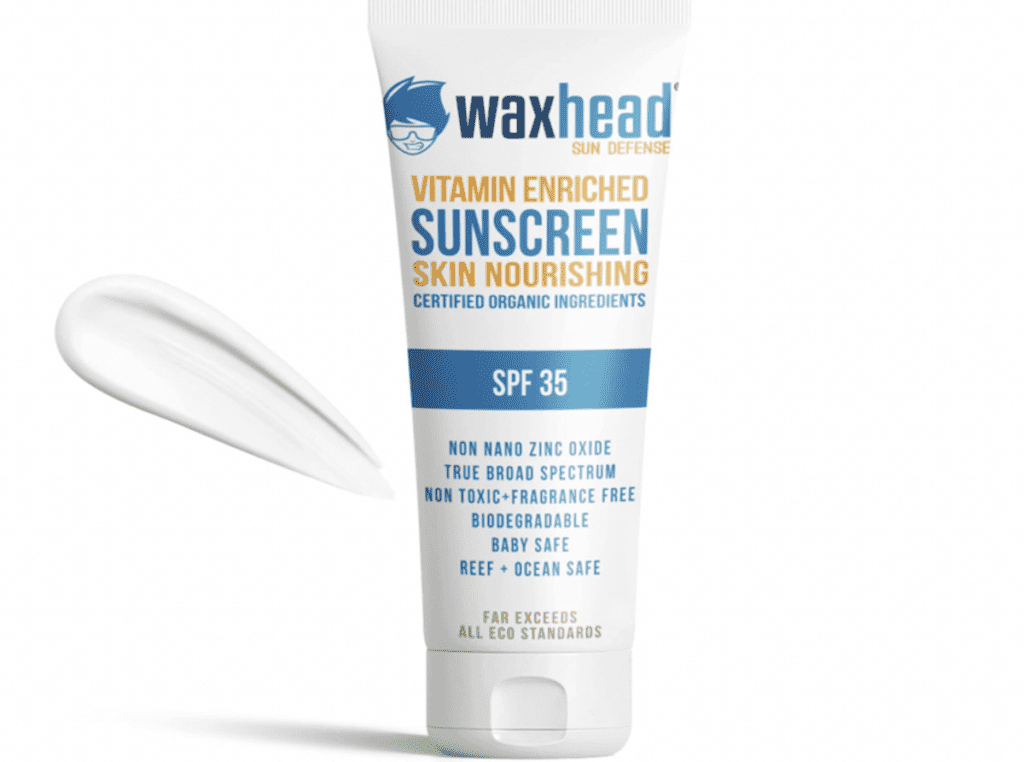

Waxhead Sun Defense Baby Zinc Oxide Vitamin E + D Sunscreen Lotion
I like Waxhead Sun Defense because it gets a high rating from the Environmental Working Group and smells amazing.
The moment I opened this product and rubbed it into my hands I LOVED it. Waxhead smells like olive oil and I am a huge fan of putting food quality ingredients on my skin.
In addition to zinc oxide, this sunscreen contains only 6 ingredients –spring water, extra virgin olive oil, beeswax, vitamin E, and vitamin D.
- 25% Non-Nano Zinc Oxide
- SPF 35
- Water Resistant
- Non-Toxic, Hypoallergenic Ingredients
- EWG Rating = 1
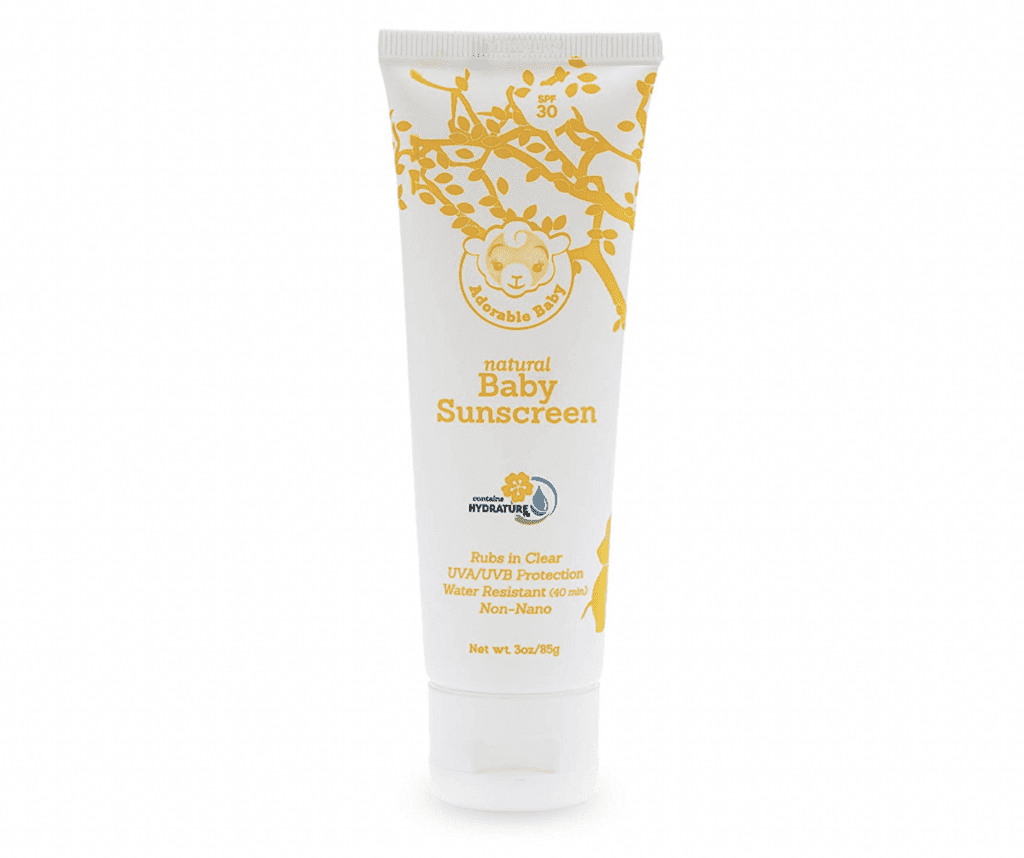

Adorable Baby Sunscreen SPF 30
Adorable Baby Sunscreen is an odorless product that glides on smoothly, leaving no white residue.
Made with a base of grapeseed oil, sunflower oil, and coconut oil, it’s slightly greasy, which I don’t mind since I live in the high desert of Colorado and have incredibly dry skin.
This clean product made with food-based ingredients gets the highest rating from EWG.
- 21% Non-Nano Zinc Oxide
- SPF 30
- Water Resistant
- Non-Toxic, All Natural Ingredients
- EWG Rating = 1
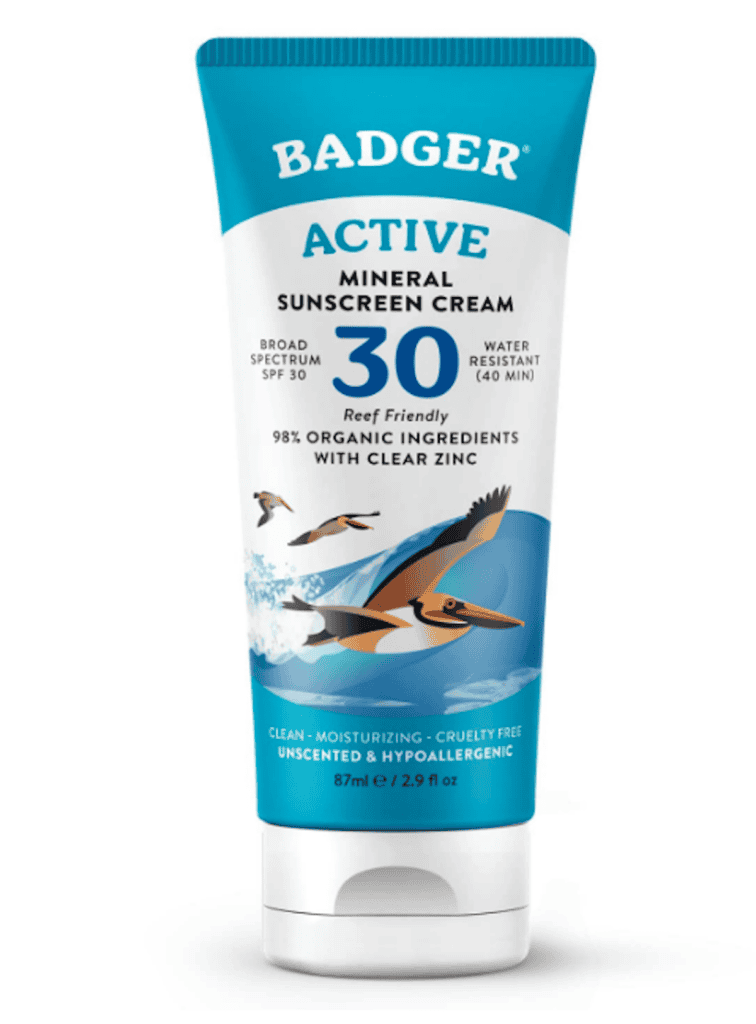

Badger Active Mineral Sunscreen
For me, Badger Active Mineral Sunscreen works because it goes on smoothly and rubs into my skin easily. It’s a little on the greasy side but an effective and safe product.
- 19% Zinc Oxide
- SPF 30
- Water Resistant
- Contains 98% Organic Ingredients
- EWG Rating = 1
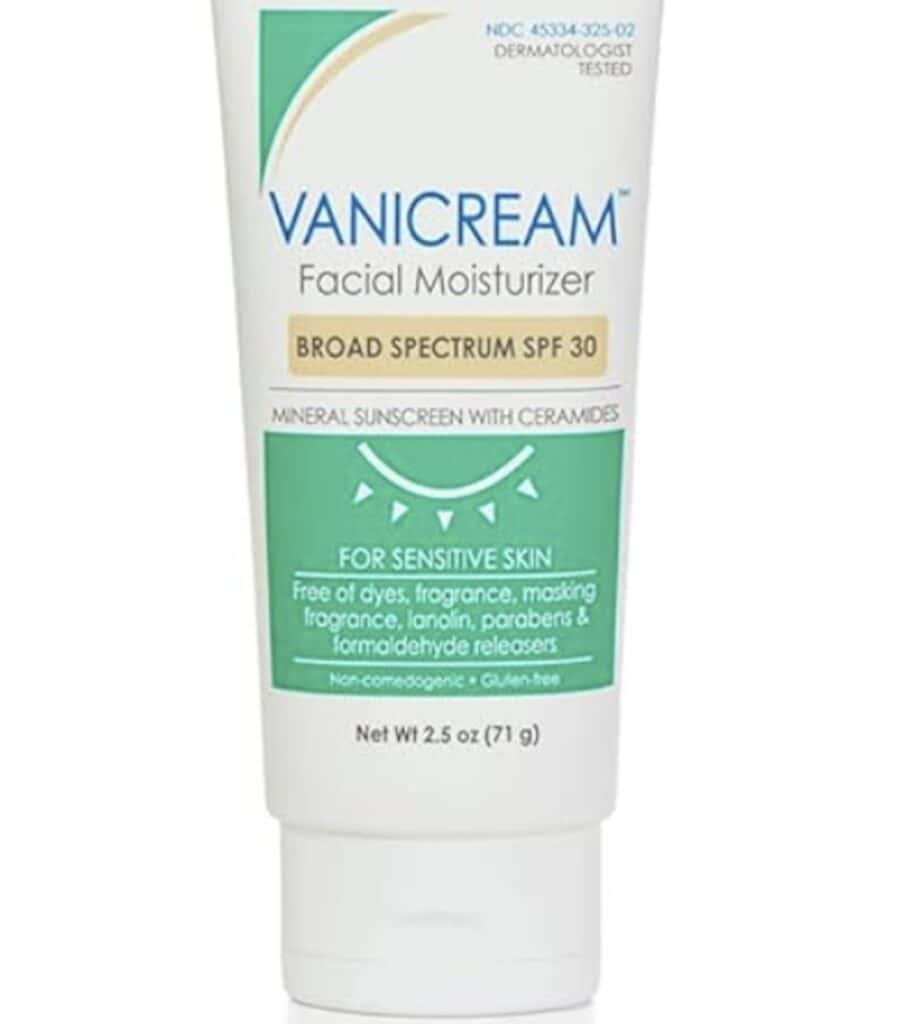

Vanicream Mineral Sunscreen
I am a fan of the Vanicream brand, and this sunscreen is no exception. In addition to zinc oxide, it contains squalene. It has a long ingredient list so it is at the bottom of my list of safer sunscreens, but I include it for those in search of a product that rubs in perfectly.
Vanicream Sunscreen rubs in easily and does not leave a white film like some of the other zinc based safer sunscreens.
- 20% Zinc Oxide
- SPF 30
- Non-Toxic, All Natural Ingredients
- EWG Rating = 1
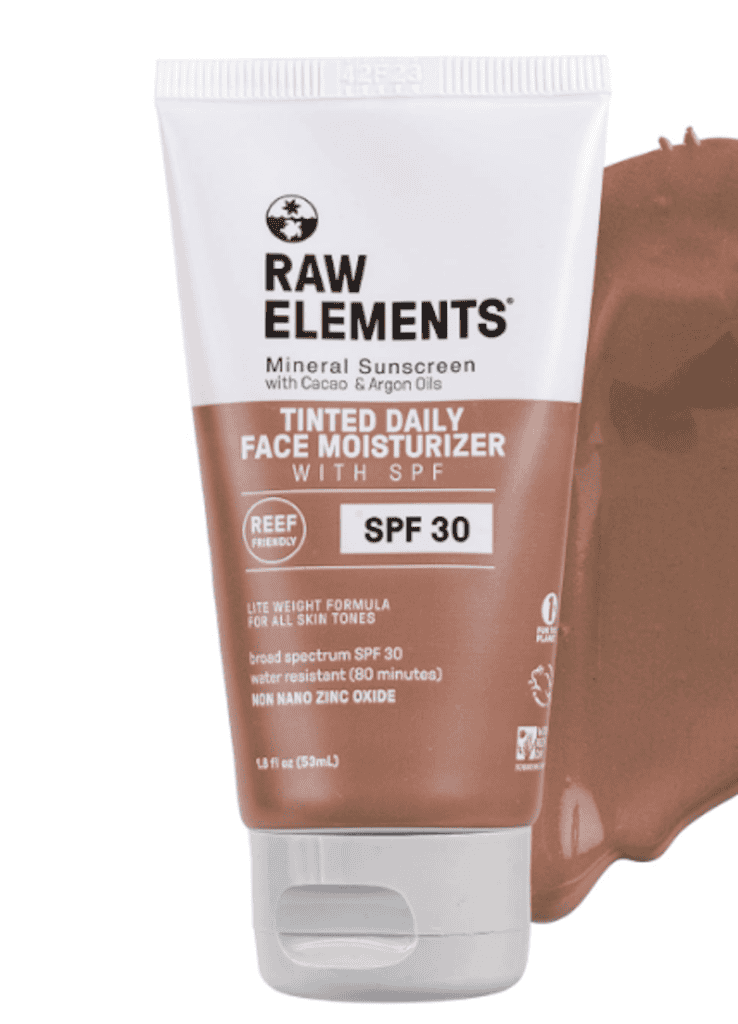

Raw Elements Tinted Mineral Sunscreen
When I’m in need of a tinted product, Raw Elements Mineral Sunscreen is the one. I use it because the color looks natural , giving me a nice little glow and it blends in easily —it’s almost like a makeup product.
- 20% Non Nano Zinc Oxide
- SPF 30
- Non-Toxic, All Natural Ingredients
- Water Resistant
- EWG Rating = 1
Is Vitamin D From the Sun
I’m often asked is vitamin D from the sun? The answer to that is yes and no.
First, what is vitamin D? It’s a fat-soluble vitamin that helps regulate calcium and phosphorus, both critical in building bone.4 Further, studies show that vitamin D may be helpful with the following:
- Reducing Cancer Cell Growth
- Controlling Infections
- Preventing Inflammation
What Vitamin D Deficiency Causes
According to nutrition researchers at Harvard, “Vitamin D deficiency may occur from a lack in diet, poor absorption, or having a metabolic need for higher amounts. If one is not eating enough vitamin D and does not receive enough ultraviolet sun exposure over an extended period, a deficiency may arise.”
Vitamin D deficiency may cause the following:
- Migraines
- Rickets
- Osteomalacia (soft bone disease)
What are Vitamin D Deficiency Symptoms
According to the Cleveland Clinic, symptoms of vitamin D deficiency may include:
- Fatigue
- Muscle Weakness
- Depression
As someone with a disease of malabsorption (celiac) and a neurological disease, these types of findings are of interest to me –I’ve tracked my vitamin D levels closely through quarterly blood work for more than two decades.
Sun Exposure Boosts Vitamin D Levels
Because optimal vitamin D levels are essential for people with MS, I take a daily D supplement and get good daily sun exposure.
When my level gets back in my optimal range, I stop taking the vitamin D supplement.
Although I wear sunscreen on my face religiously, I’m not afraid to get some good sun exposure on my arms and legs every day!
It helps with my vitamin D levels, and the sunshine feels great when I go out for my daily walks.
Clean Living and Sun Block
The sunscreen debate can be a heated one (pun intended), and I take the middle path, using it on my face but not the rest of my body. What’s your strategy when it comes to the sun? Do you use sunscreen or not?
Safer Sunscreen is an oldie but goodie from archives. I first shared this post in 2017.

